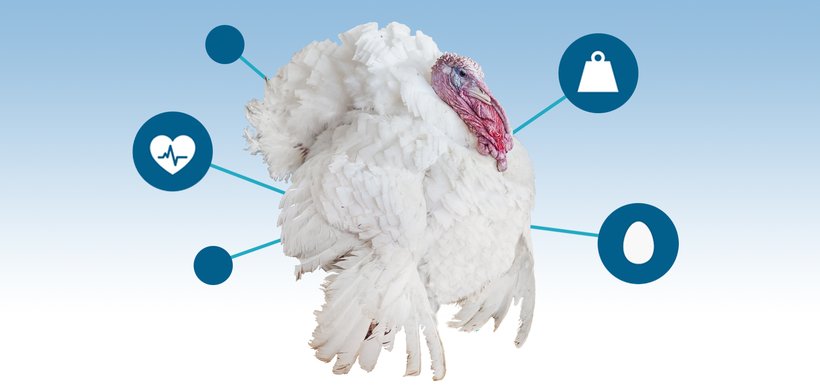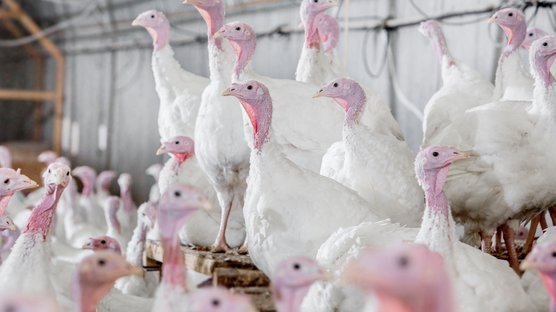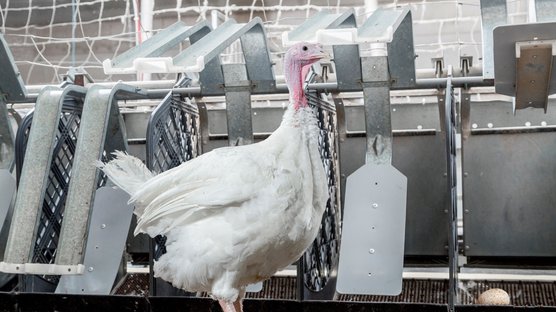
Published on March 10, 2021
The journey to sustainable breeding
Over the years, we’ve seen a slow evolution of who drives the demand for desirable traits in turkey breeding. History has taught us that the most valued trait is a moving target, but what can we look for in the future? It is becoming clear that a successful turkey industry will be a sustainable industry. To make this a reality, our breeding program continues to shift from balanced breeding to sustainable breeding.
The evolution of breeding goals
Primary turkey breeding companies have been around since the early 1950s. In the beginning, the industry mostly consisted of independent hatcheries, growers and processors. Over time, integrated turkey operations became the norm. Because of these industry changes, breeding goals have gone through some dramatic changes. In the early fifties, the focus was on the production of poults. Next, importance shifted to low cost, high quality breast meat yield in the processing plant. Sustainability-related goals, such as animal health, food safety, and environmental impact are not new drivers. In fact, the traits we select for have not changed, but their depth and added value has grown beyond economics. We believe that sustainability-focused traits will not only continue to be an important focus, but they will be vital for the survival of the industry.
Breeding goals – economics plus sustainability
Breeding is now undergoing a transition from balanced to sustainable breeding. What does this mean? Take the tried-and-true feed conversion as an example. Delivering the most efficient turkeys has been one of our key differentiators as it means lower feed costs in your operations. But now, a better feed conversion rate delivers economic value and environmental benefits. If a significant portion of the turkeys in the world are more feed efficient, this means less resources are needed to grow and process the materials for feed. In all our pedigree facilities, feed stations are installed to track individual birds and select those that are most efficient at converting feed.
Livability and calm behavior are also important traits in getting the most economic value from each flock. But we also know that a robust, adaptable turkey makes management easier and creates a more animal welfare-friendly system. To improve hatchability, which contributes to the bottom line and reduces waste in production, we are currently studying the use of genomic selection to identify and remove lethal markers in the turkey genetic line. We’ve recently added more markers to our most recent SNP chip for more accurate selection.

Market requirements are constantly evolving. Not so long ago the ‘needs’ were suggested by the next link in the value chain. Our role as a primary breeder is to satisfy the current needs and anticipate future needs of the market. We believe that sustainable breeding must be a focus in order to drive us towards a better future.
Turkeys are not the only species making this shift from balanced to sustainable breeding. In our swine breeding program, we aim to select pigs that are easy to manage. Animals that can take care of themselves, without intervention or support, are a key component of social agricultural development. This includes sows that perform well in any housing system while we move to free gestation and free farrowing systems in the years to come.
Click here to learn more about sustainable breeding in swine
For laying hens, inovo sexing continues to be an area of investigation in the industry. Eliminating the practice of culling male day-old chicks has major implications for improving animal welfare as well as saving the cost of unnecessary destruction. Despite much ongoing research, the technology is simply not yet ready, but the opportunity for innovation is there.
For turkey producers, economic value is the cornerstone. For that reason, genetic progress first and foremost creates economic returns. However, it is exciting to see genetic progress become multi-faceted to combine both economics and sustainability. The picture is becoming clearer that sustainability is not just a buzz word, it means real benefit in terms of economic value and protection of the future of the industry.



